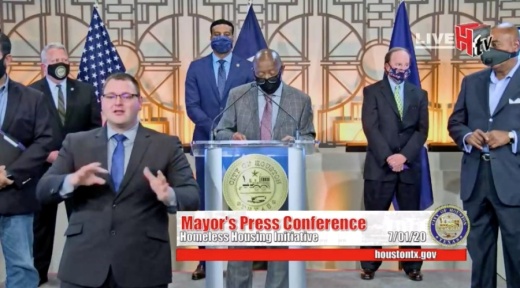The facility—which is being dubbed the Respite, Rehabilitation and Re-entry Center—would be managed by the Harris Center for Mental Health and Intellectual and Development Disabilities.
The facility will target individuals who are homeless and have significant mental health issues, Harris Center CEO Wayne Young said. Many people the facility is designed to help also have overlapping interactions with the criminal justice system, he said.
By providing housing and treatment to these individuals, Young said, the facility will also help reduce the spread of COVID-19. The goal is to have a grand opening in November, he said.
"The timing is critical so we can diminish the impact of COVID[-19] in this population," Young said.
The center is part of a broader homelessness program between the city and county that seeks to end chronic homelessness in Harris County entirely.
Young said opening a mental health facility for the county's most at-risk population is a core piece of filling the current gaps in services.
"A lot of our previous efforts focused engagement and transition to housing," Young said. "The intensive services were not available. From our stakeholder conversations, we had the opportunity to begin looking at the challenges of those we were having a harder time finding long-term housing for and what would be considered some best practices in trying to engage those individuals."
If approved, the facility would serve roughly 108 people at a time, Young said, with robust staffing around the clock. The plan calls for hiring a wide variety of staff members, including rehab professionals, master level counselors, mental health professionals, housing and employment specialists, peer support specialists, care coordinators and nurses as well as psychiatric care and primary care physicians who would be there at least part-time.
Other examples of the situations by which a person could be admitted to the facility include people leaving jail or coming out of psychiatric hospital settings who are homeless and have nowhere to go, Young said.
Before the center can open, Harris County and the city of Houston need to approve an interlocal agreement, something Young said he expects to be approved by Harris County at a Sept. 15 Commissioners Court meeting and by the city at a Houston City Council meeting the next day. If it is approved, Young said, he anticipates another stakeholder gathering to determine specific goals his team would look to accomplish.
"It has a lot to do with people with complex behavioral health issues [or] with issues in the criminal justice system being in recovery, living their best lives and remaining housed," he said.
The location targeted for the facility is 6160 S. Loop E., Houston, within the former Pine Valley Specialty Hospital, according to documents submitted to Harris County Commissioners Court.
The city of Houston and Harris County are looking to contribute $5 million each to purchase and renovate the property and cover the cost of services for one year.
The court's five commissioners voted unanimously on a resolution to fund their share of the project at an Aug. 25 court meeting.
The city is looking to have its share reimbursed by the Coronavirus Aid, Relief and Economic Stability Act, and the county is using grant funding from the U.S. Department of Health and Human Services, Young said.
Young said he believes the new center will serve as an example of something other communities will look to emulate. He lauded both the city and county for expressing willingness to fund the project.
"What we’re describing and what we’re contemplating putting in place ... would be seen as a best practice and a goal that communities are reaching for," he said. "I think very few of them have actually been able to muster the resources to bring it to fruition."





